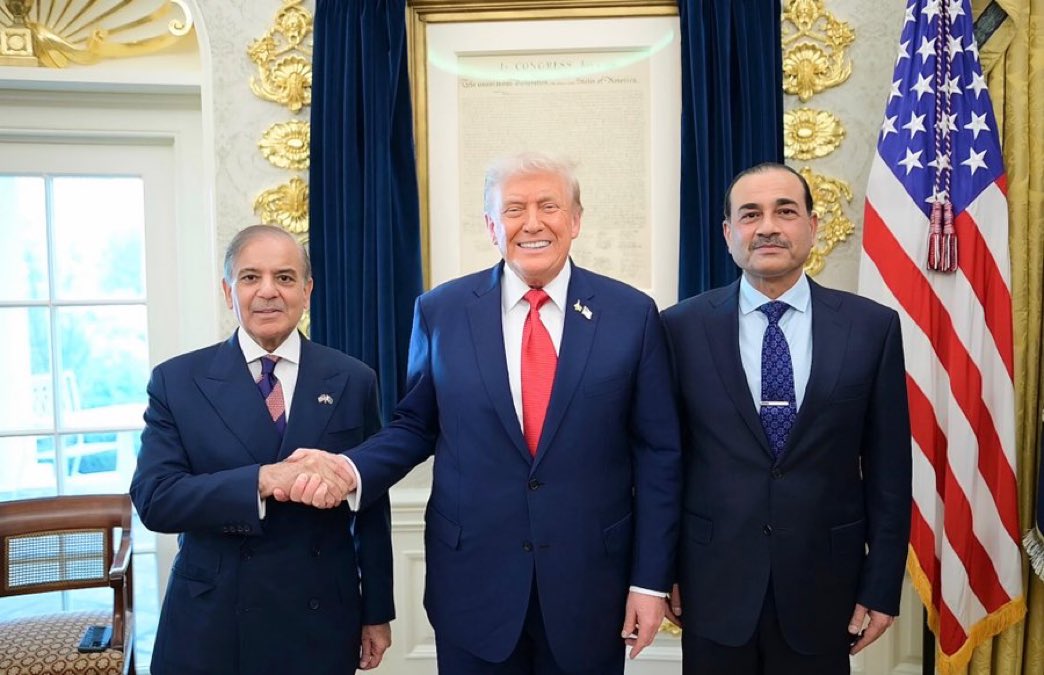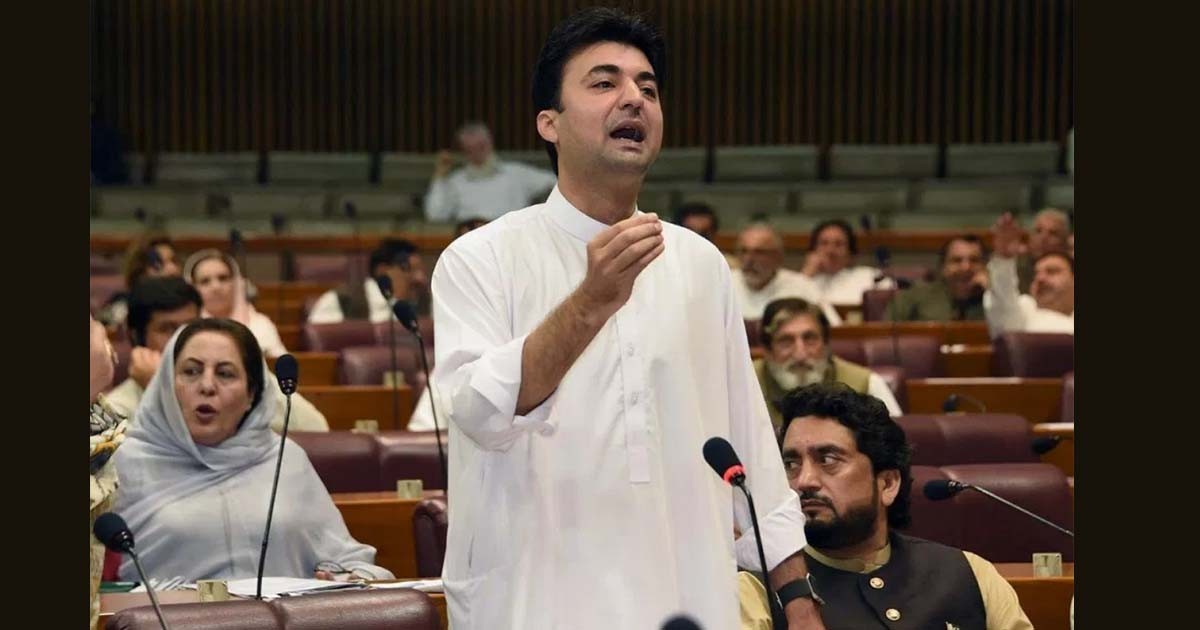Pakistan’s Prime Minister Shehbaz Sharif’s first official visit to the White House on Thursday unfolded with grandeur and symbolism.
Although the meeting began later than scheduled — owing to President Donald Trump’s earlier engagement running over time — the Oval Office encounter highlighted the distinct personal styles of both leaders: Trump’s flamboyance contrasted with Shehbaz’s measured composure.
Prime Minister Muhammad Shehbaz Sharif and Field Marshal Syed Asim Munir met with U.S. President Donald J. Trump at the Oval Office today.
The Prime Minister lauded President Trump’s “bold, courageous and decisive leadership” for facilitating the Pakistan-India ceasefire and… pic.twitter.com/Xy5hHsl2Nk
— Government of Pakistan (@GovtofPakistan) September 26, 2025
This was the first formal bilateral interaction between the two leaders and marked a significant moment in Pakistan-US ties, coming six years after former PM Imran Khan’s 2019 Oval Office meeting with Trump.
Red Carpet Welcome
Photos released by the PM Office showed Shehbaz receiving a red-carpet welcome at Andrews Air Base before proceeding under tight security to 1600 Pennsylvania Avenue. He was accompanied by Field Marshal Asim Munir, who had earlier this year attended a White House lunch with the US president.
PM Shehbaz Sharif’s red carpet welcome in the US signals renewed diplomatic overtures, testing how far Islamabad and Washington are willing to recalibrate ties. pic.twitter.com/IR5ObZ7Gzh
— Hafsa (@LionceauEtoile7) September 25, 2025
From the American side, Vice President JD Vance and Secretary of State Marco Rubio joined the discussions. Images later showed animated exchanges between Trump, Shehbaz, and Munir, with the US president flashing his trademark thumbs-up. The PM Office later described the atmosphere as “pleasant.”
After the meeting, Shehbaz was scheduled to travel to New York to address the 80th UN General Assembly session.
Behind Closed Doors
In a departure from Trump’s usual penchant for Oval Office photo opportunities, the meeting was closed to the press. While this created an air of secrecy, officials suggested the interaction was far more substantive than a mere photo-op.
Prime Minister Muhammad Shehbaz Sharif and Field Marshal Syed Asim Munir Chief of Army Staff met President of the United States, Donald Trump in White House, Washington. pic.twitter.com/0uSC9LH8WK
— Government of Pakistan (@GovtofPakistan) September 25, 2025
The White House had only confirmed the meeting late Wednesday night, listing it for 4:30pm. However, Trump’s previous event — signing a memorandum on domestic political violence — ran over time.
Read more: India signs $7 bn deal for 97 domestically made fighter jets
During his interaction with reporters before Shehbaz’s arrival, Trump digressed from discussing Russia and Ukraine to praise his Pakistani guests, referring to both the prime minister and field marshal as “great leaders.”
Press pool photographs later captured Shehbaz and Munir waiting patiently on the Oval Office’s gilded sofas as Trump concluded his earlier engagement.
🇵🇰🤝🇺🇸 Leadership with warmth, diplomacy with respect.
{@CMShehbaz _ @marcorubio} pic.twitter.com/6TbZshUEFZ
— Shehbaz Diplomacy (@ShehbazDipl) September 25, 2025
Has India finally lost it’s importance?
The Oval Office meeting carried symbolism beyond ceremony. Trump, who has recently been pressing his case for a Nobel Peace Prize, has repeatedly claimed credit for defusing tensions between India and Pakistan earlier this year. For Islamabad, the visit reinforced the narrative that Pakistan continues to matter in Washington’s strategic thinking, despite the US’s relationship with New Delhi.
Trump says: Prime Minister Shebaz Sharif is a great leader, Field Marshall Asim Munir is a great guy. How will Modi’s media digest it?
— Ashok Swain (@ashoswai) September 25, 2025
Pakistan’s growing prominence on the global stage, highlighted by Prime Minister Shehbaz Sharif and Army Chief Asim Munir’s red-carpet reception in Washington DC with President Trump, has contrasted sharply with India’s declining regional influence.
Is that a fighter jet lapel pin on Trump’s suit?
But why?? pic.twitter.com/8ovYaCmy71— Tejasswi Prakash (@Tiju0Prakash) September 26, 2025
Modi’s strategic initiatives to assert India’s dominance face setbacks as Islamabad strengthens its international partnerships and security role, leaving New Delhi increasingly sidelined in key diplomatic and geopolitical arenas.
Expanding Economic Links
Though the official agenda remained under wraps, analysts widely expected discussions to cover minerals, trade, and regional security. In recent months, Islamabad and Washington have moved closer in emerging economic sectors.
Earlier this month, Pakistan signed a $500 million MoU with US Strategic Metals — hailed by American diplomats as a landmark deal. Similarly, in April, the Pakistan Crypto Council partnered with Trump-backed World Liberty Financial to expand blockchain adoption.
Read more: China’s Xi Supports Climate Control taking Global Leadership away from Trump’s America
Observers also pointed to Field Marshal Munir’s presence as a signal that counterterror cooperation, Pakistan’s role in Middle East peace efforts, and regional security — including the Pakistan-Saudi defence pact and talks of a UN-backed Gaza peace force — were high on the agenda.
Regional and Global Engagements
Ties with India were also expected to feature prominently, particularly amid heightened regional frictions.
New York: Prime Minister Muhammad Shehbaz Sharif held a bilateral meeting with Mr.Bill Gates, Chair of Gates Foundation on the sidelines of 80th Session of UNGA. 25 September 2025. pic.twitter.com/VyzlfHOmem
— Attaullah Tarar (@TararAttaullah) September 25, 2025
Before arriving in Washington, Shehbaz had engaged in a string of high-profile sideline meetings at the UNGA in New York. He met Gates Foundation chair Bill Gates, appreciating the foundation’s continued support for polio eradication, nutrition programs, and financial inclusion in Pakistan, as well as contributions to flood recovery in 2022 and 2025.
In a separate meeting with Bangladeshi leader Muhammad Yunus, both sides discussed strengthening bilateral cooperation in trade, connectivity, and people-to-people exchanges — a sign of Islamabad’s effort to calibrate ties across South Asia.
Story by GVS US and Intl Desk














